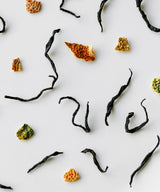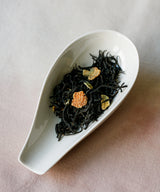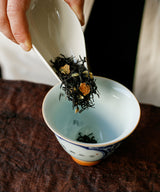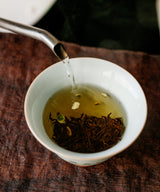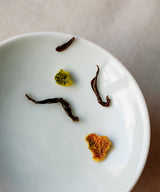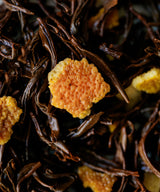Yuzu & Gold Guanyin
日本柚子・金观音
Harvest
November 2023
Origin
Longquan, Zhejiang
Yuzu is a citrus fruit that people often become quite transfixed by. There is a strange and unmissable floral quality to the scent of yuzu, while it references almost every citrus imaginable – grapefruit, sweet orange, bergamot, lime. The complexity of its scent is so beguiling you want to keep returning to it, like its a puzzle you might be able to solve. Yuzu is believed to have originated along the Yangtze River in China. It is a hybrid of an ancient lime, called Ichang Papeda 宜昌橙, and a sour mandarin orange. Depending on it’s ripeness it appears in many vibrant colours - yellow, orange, green - all with dense, dimpled peels. Yuzu first arrived in Japan, where it is now far more common, during the Tang Dynasty over 1000 years ago. While yuzu has since been widely cultivated in Japan and integrated into Japanese cooking, it has become very rare in China, with only a few farms still growing it. In China it is not often seen as an ingredient, and is costly in whatever context it appears.
On account of this, I am amazed to have found this Gold Guanyin black tea scented with yuzu from one of the few farms in China that still grows it. This tea is extremely rare – not only for the use of Chinese yuzu, but also for the meticulous process in which the black tea is scented by hand. In this tea the scent of both unripe and ripe yuzu are transferred to the semi-wild Guanyin tea from Longquan. Through the careful scenting process, this rich black tea is able to capture and preserve the intense, aromatic oils of the citrus.
First, unripened, green yuzu is harvested early in September. Each yuzu is peeled by hand, and then its rind is broken apart into pieces. These pieces are spread out on wide, bamboo trays, and layered with tea leaves. The tea and peel rest in the open air for 12 hours like this, then the trays are baked at low temperatures to ensure all of the citrus’ oils have transferred to the tea leaves. This process is repeated with the sweeter smelling orange yuzu once it has ripened, near the end of October. The tea is then transferred to a sealed container and combined with dried yuzu peel, both green and orange, that has been crushed into very small pieces. When you prepare the tea you will see these little pieces of the citrus become reinvigorated; they almost appear fluorescent amongst the dark tea leaves.
It should be no surprise that this tea is intensely fragrant, full of the aromatic oils from the yuzu peels. It is also tireless: the scent of yuzu lingers in the room after many infusions of the tea. Drinking the tea, the bright citrus taste comes first, and then finishes with sweet, caramel notes from the black tea. This tea is as compelling as yuzu is, balanced by the soothing and earthy qualities of the semi-wild Guanyin. Again, and again, you will want to catch its scent in the gaiwan.
. . .
Brewing guide
| Tea | 4g |
| Temperature | 90 °C |
| Water | 120ml |
| Steep time | 10 - 60 sec |
| No. of infusions | 8 |

